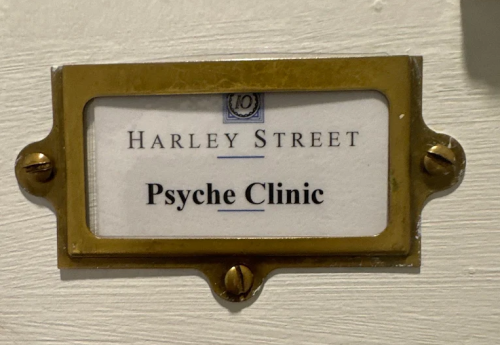






Psyche Clinic
Treatment Focus
This center treats mental health conditions and co-occurring substance use. You receive collaborative, individualized treatment that addresses both issues for whole-person healing.
Primary Level of Care
Delivers regular one-on-one sessions focused on emotional support, coping strategies, and goal-setting, fostering long-term healing and personal development in an outpatient setting.
Claimed
Recovery.com has connected directly with this treatment provider to validate the information in their profile.
Treatment Focus
This center treats mental health conditions and co-occurring substance use. You receive collaborative, individualized treatment that addresses both issues for whole-person healing.
Primary Level of Care
Delivers regular one-on-one sessions focused on emotional support, coping strategies, and goal-setting, fostering long-term healing and personal development in an outpatient setting.
Provider's Policy
The center also accepts BUPA, AVIVA, AXA PPP, SimplyHealth, Vitality Health, and Allianz. Self-pay rates are listed for assessments, therapy, testing, and inpatient fees. Contact the clinic to confirm coverage, request costs, or schedule your appointment.
Psyche Clinic
Psyche Clinic
About Psyche Clinic
Located at Ten Harley Street near Oxford Circus, Psyche Clinic provides therapist-led mental health care for anxiety, depression, trauma, ADHD, OCD, bipolar disorder, substance use disorder, burnout, postnatal depression, and more. They offer full psychiatric and psychological assessments, therapy, medication management, ADHD evaluations, and optional inpatient detox or rehab through trusted partners. Flexible virtual and in-person appointments are available Monday–Friday, 9:00 a.m.–6:00 p.m.
Transform Patterns with Guidance
The clinic helps patients understand their symptoms and build lasting emotional stability using therapies such as CBT, DBT, EMDR, ACT, psychodynamic psychotherapy, trauma-focused approaches, and group-based methods. Psychiatrists provide clear medication guidance to support healthier thinking, improved mood, and better daily functioning..
Access Insightful Specialist Care
Psyche Clinic offers advanced OCD treatment, detailed ADHD assessments, addiction and alcohol support, psychiatric court reports, and pharmacogenomic testing to tailor medication. Their VIP psychiatry package includes weekly sessions with a senior consultant psychiatrist and limited text support between appointments for close, ongoing guidance.
The clinic also coordinates with GPs and insurers for smoother access to care. With experienced consultant psychiatrists and modern therapy rooms, Psyche Clinic provides a safe, supportive environment to help individuals make steady progress and maintain long-term wellbeing.
Center Overview
Treatment Focus
This center treats mental health conditions and co-occurring substance use. You receive collaborative, individualized treatment that addresses both issues for whole-person healing.
Insurance Accepted
Cash Pay Rates
Estimated Cash Pay Rate
Center pricing can vary based on program and length of stay. Contact the center for more information. Recovery.com strives for price transparency so you can make an informed decision.
Levels of Care





Your Care Options
Specializations
Anxiety
Anxiety is a common mental health condition that can include excessive worry, panic attacks, physical tension, and increased blood pressure.
Depression
Symptoms of depression may include fatigue, a sense of numbness, and loss of interest in activities. This condition can range from mild to severe.
Obsessive Compulsive Disorder (OCD)
OCD is characterized by intrusive and distressing thoughts that drive repetitive behaviors. This pattern disrupts daily life and relationships.
Trauma
Some traumatic events are so disturbing that they cause long-term mental health problems. Those ongoing issues can also be referred to as "trauma."
ADHD, ADD
ADHD is a common mental health condition caused by dopamine imbalance. Common symptoms include inattention, hyperactivitiy, and impulsivity.
Who We Treat
Men and Women
Men and women attend treatment for addiction in a co-ed setting, going to therapy groups together to share experiences, struggles, and successes.
Midlife Adults
For adults ages 40+, treatment shifts to focus on the unique challenges, blocks, and risk factors of their age group, and unites peers in a similar community.
Approaches
Evidence-Based
A combination of scientifically rooted therapies and treatments make up evidence-based care, defined by their measured and proven results.
Individual Treatment
Individual care meets the needs of each patient, using personalized treatment to provide them the most relevant care and greatest chance of success.
Therapies
Stress Management
Patients learn specific stress management techniques, like breathing exercises and how to safely anticipate triggers.
1-on-1 Counseling
Patient and therapist meet 1-on-1 to work through difficult emotions and behavioral challenges in a personal, private setting.
Family Therapy
Family therapy addresses group dynamics within a family system, with a focus on improving communication and interrupting unhealthy relationship patterns.
Acceptance and Commitment Therapy (ACT)
This cognitive behavioral therapy teaches patients to accept challenging feelings and make the appropriate changes to reach personal goals.
Psychoeducation
This method combines treatment with education, teaching patients about different paths toward recovery. This empowers them to make more effective decisions.
Trauma-Specific Therapy
This form of talk therapy addresses any childhood trauma at the root of a patient's current diagnosis.
Conditions We Treat
Post Traumatic Stress Disorder
PTSD is a long-term mental health issue caused by a disturbing event or events. Symptoms include anxiety, dissociation, flashbacks, and intrusive thoughts.
Anxiety
Anxiety is a common mental health condition that can include excessive worry, panic attacks, physical tension, and increased blood pressure.
Depression
Symptoms of depression may include fatigue, a sense of numbness, and loss of interest in activities. This condition can range from mild to severe.
Grief and Loss
Grief is a natural reaction to loss, but severe grief can interfere with your ability to function. You can get treatment for this condition.
Obsessive Compulsive Disorder (OCD)
OCD is characterized by intrusive and distressing thoughts that drive repetitive behaviors. This pattern disrupts daily life and relationships.
Personality Disorders
Personality disorders destabilize the way a person thinks, feels, and behaves. If untreated, they can undermine relationships and lead to severe distress.
Stress
Stress is a natural reaction to challenges, and it can even help you adapt. However, chronic stress can cause physical and mental health issues.
Bipolar
This mental health condition is characterized by extreme mood swings between depression, mania, and remission.
Substances We Treat
Co-Occurring Disorders
A person with multiple mental health diagnoses, such as addiction and depression, has co-occurring disorders also called dual diagnosis.
Drug Addiction
Drug addiction is the excessive and repetitive use of substances, despite harmful consequences to a person's life, health, and relationships.
Alcohol
Using alcohol as a coping mechanism, or drinking excessively throughout the week, signals an alcohol use disorder.






